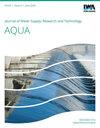Equity analysis of intermittent water supply systems by means of EPA-SWMM
IF 4.3
Q2 Environmental Science
引用次数: 1
Abstract
Intermittent water supply (IWS) is a frequent operation approach in developing countries. A number of factors contribute to IWS, such as leakage and water shortage, leading to inequitable water distribution. A way to reduce the inequity in IWS systems is by planning or adapting the network for equitable water distribution, which requires software capable of describing IWS conditions, including not only pressurized flow but also free-surface. In this paper, a new index for equity analysis is presented and compared with the existing indices available in scientific literature. The comparison is based on the EPA-SWMM modelling framework and standard IWS operations, including pipe emptying and filling, have been considered. Results reveal that EPA-SWMM has great potential in simulating IWS systems, especially in the application for equity analyses, as it provides a more realistic description of the pipe filling and emptying operations compared to standard water distribution modelling software. Furthermore, a novel equation called volumetric coefficient was developed which has a significant advantage in identifying the nodes with a higher impact on network equity, and ensuring the fair distribution of supply along the distribution network, considering the relevance of nodal demand, which none of the other indexes in the literature were addressed.基于EPA-SWMM的间歇供水系统公平性分析
间歇式供水是发展中国家常用的一种运行方式。造成IWS的因素有很多,例如漏水和缺水,导致水资源分配不公平。减少IWS系统不平等的一种方法是通过规划或调整网络来实现公平的水分配,这需要能够描述IWS条件的软件,不仅包括加压流量,还包括自由水面。本文提出了一种新的公平分析指标,并与科学文献中已有的指标进行了比较。比较是基于EPA-SWMM建模框架和标准IWS操作,包括管道排空和填充。结果表明,EPA-SWMM在模拟IWS系统方面具有很大的潜力,特别是在公平性分析方面的应用,因为与标准的水分配建模软件相比,它提供了更真实的管道充水和排空操作描述。此外,我们还开发了一个名为容量系数的新方程,该方程在识别对网络公平影响较大的节点方面具有显著的优势,并考虑到节点需求的相关性,确保沿配电网公平分配供应,这是文献中其他指标都没有解决的。
本文章由计算机程序翻译,如有差异,请以英文原文为准。
求助全文
约1分钟内获得全文
求助全文
来源期刊
CiteScore
4.70
自引率
0.00%
发文量
74
审稿时长
4.5 months
期刊介绍:
Journal of Water Supply: Research and Technology - Aqua publishes peer-reviewed scientific & technical, review, and practical/ operational papers dealing with research and development in water supply technology and management, including economics, training and public relations on a national and international level.

 求助内容:
求助内容: 应助结果提醒方式:
应助结果提醒方式:


